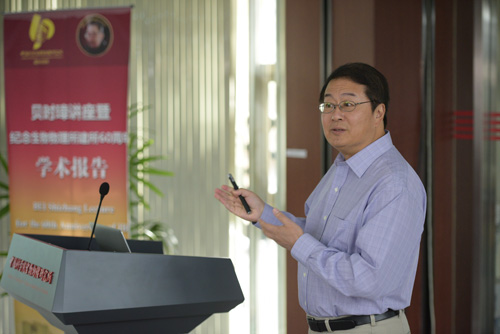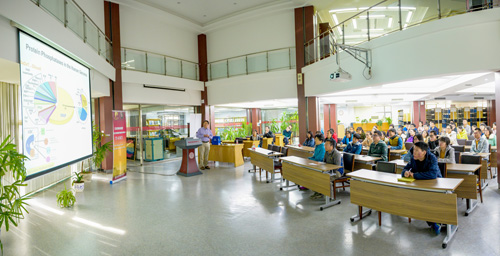Prof. Zhong-Yin Zhang from the Purdue University Visited IBP and Delivered the Shizhang Bei Lecture
On November 6, 2018, Prof. Zhong-Yin Zhang visited Institute of Biophysics, CAS and gave a lecture entitled “Drugging the Undruggable: Targeting Protein Tyrosine Phosphatases for Novel Therapeutic Agents”. The lecture was hosted by Prof. Hong Zhang, and was part of the special lecture series named “Shizhang Bei Lecture” of Institute of Biophysics.
Research in Prof. Zhong-Yin Zhang`s laboratory spans the disciplines of chemistry and biology with an emphasis on the structure and function of protein tyrosine phosphatases (PTPs), roles of PTP in normal physiology and pathological conditions, and the design and synthesis of PTP inhibitors as chemical probes to interrogate PTP function and as novel therapeutics for the treatment of cancer, diabetes and obesity, autoimmune disorders, neurodegenerative and infectious diseases.
In his seminar, Prof. Zhong-Yin Zhang first introduced their recent functional studies of oncogenic PTPs that yield new insights into the molecular basis that underlies tumorigenesis. The Src homology 2 domain containing protein tyrosine phosphatase-2 (SHP2) is an oncogenic phosphatase. They identified a novel hydroxyindole carboxylic acid-based SHP2 inhibitor block growth factor induced Ras activation and exhibit broad spectrum anti-cancer activity. Given that SHP2 directly downstream of receptor PTKs, targeting growth factor pathway at the level of SHP2 may offer unique advantages in kinase inhibitor resistance settings.
He then described that deletion of phosphatase of regenerating liver 2 (PRL2), the most ubiquitously expressed PRL family member, leads to impaired placental development and retarded growth at both embryonic and adult stages. And they found that the tumor suppressor PTEN(PTP family, one of the most inactivated tumor suppressors) is elevated in PRL2-deficient placenta. Biochemical analyses indicate that PRL2 promotes Akt activation by down-regulating PTEN through the proteasome pathway.
Finally, he discussed several novel approaches for acquisition of highly potent and selective PTP inhibitors with efficacious biological activity. Potent and specific PTP inhibitors could significantly facilitate functional analysis of the PTPs in complex cellular signal transduction pathways and may constitute valuable therapeutics for many human diseases.
Prof. Zhong-Yin Zhang gave the lecture with vivid words, rigorous logic and great passion, which can be a lively lesson for the audience. Many investigators from Institute of Biophysics attending the lecture. After the lecture, Prof. Zhong-Yin Zhang and the audience shared their views on the issues of common interest.

Prof. Zhong-Yin Zhang is giving the lecture

The Audience
(Reported by Zhang Hong's group)
(Photographer: Qiang Wang (IBP))

